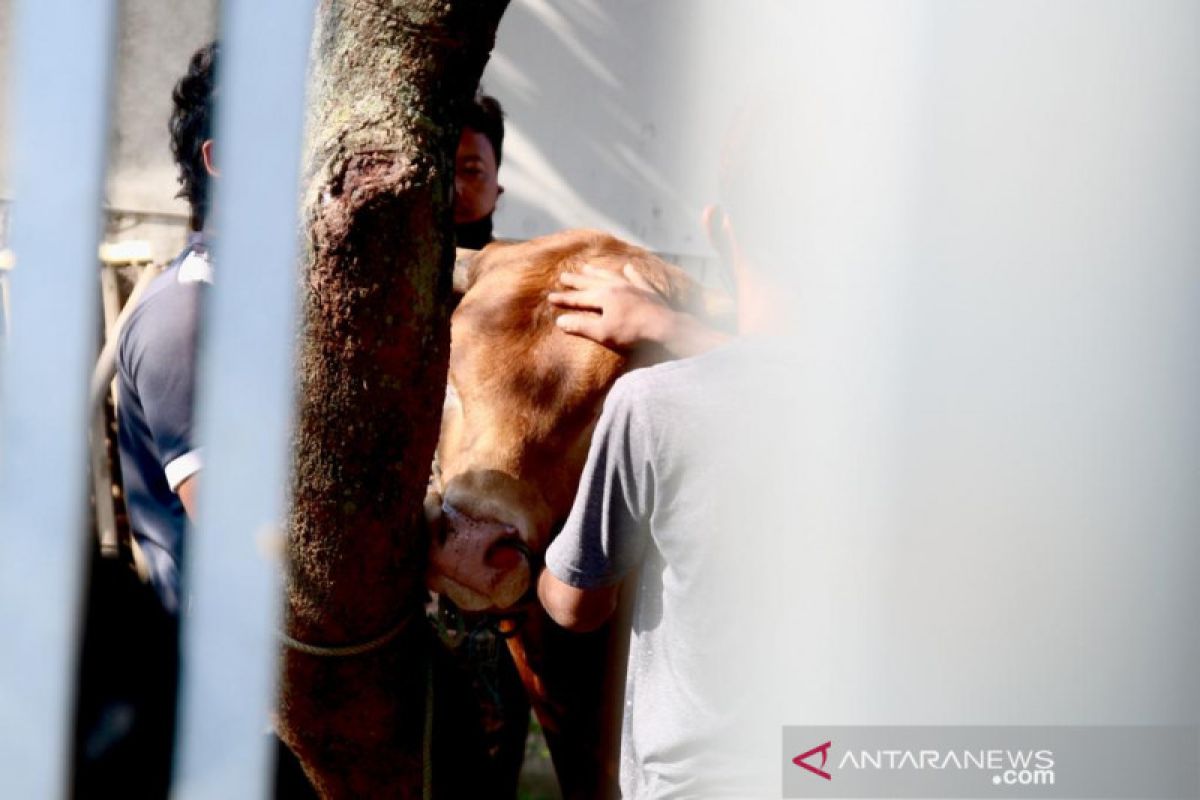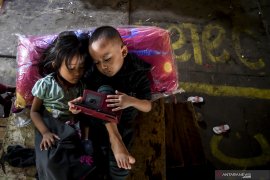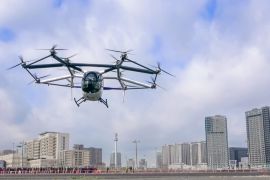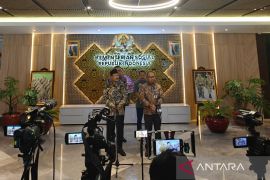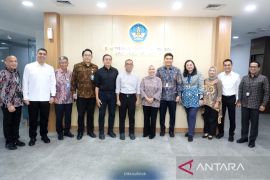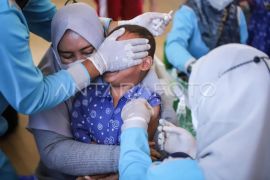Our target is to finish the job as quickly as possible, so people do not have to stay for a longer time at the same place, as it could pose a greater risk of infectionJakarta (ANTARA) - Eid al-Adha, or the Day of Sacrifice, is one of the two major festivals apart from Eid al-Fitr for Indonesia, where over 200 million of the population identify themselves as Muslims.
On the Islamic holiday, which falls on 10th day of Dhu al-Hijjah, or the last month of the Islamic lunar calendar, Muslims worldwide will perform mass prayers, slaughter sacrificed animals, and distribute the meat to poor neighborhoods and people in need.
However, amid the COVID-19 pandemic, few traditions of Eid al-Adha have to be aligned with health protocols necessitated by the Indonesian government, as the country’s daily tally remains at one to two thousand cases in the past weeks, thereby taking the total number of confirmed cases to over 100 thousand, with over five thousand deaths.
For this year’s celebrations, the Indonesian government has allowed Muslims in green zone areas or places, with low confirmed cases, to perform mass prayers at a mosque or open field. However, Muslims in red zone areas, or places with high number of positive cases, were prompted to offer prayers at home.
Muslims in Indonesia welcomed the government’s decision by complying with basic health protocols, such as maintaining a physical distance, wearing face mask, and practicing personal hygiene, to curb risks of infection.
At a mosque in Depok, a city in West Java Province and part of Greater Jakarta, Muslims did not merely follow health protocols but also seek alternative methods to practice slaughter in a safe manner. One of the changes include limiting the number of people participating in the slaughter and hiring professional butchers instead.
“Our target is to finish the job as quickly as possible, so people do not have to stay for a longer time at the same place, as it could pose a greater risk of infection,” Muhammad Said, 57, an administrator of the Majelis Ta’lim Al-Fikri Mosque, stated in Depok, Friday.
During this year’s slaughter, the mosque administrator called in four professional butchers to complete the ritual, starting from slaughtering the animals and stripping the skin from the flesh and bone, to breaking down the meat into cuts and packaging and distributing the meat to over 40 families in the neighborhood and other poor communities located in proximity.
"A lot of work needs to be done in slaughtering sacrificed animals. It would take five to seven hours to complete all jobs, but with the task handed to professionals, we could cut the time down to three hours," he explained while saying that the mosque had slaughtered two premium-sized cows and a goat.
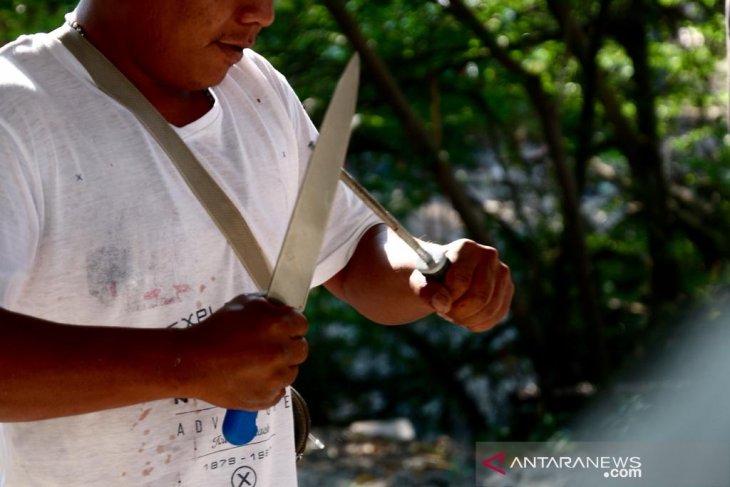
COVID-19 has raised concerns among Muslims in the neighborhood, mainly over how to continue to practice the Eid al-Adha tradition, with less risks of infection, Said noted.
However, he believed the mosque’s decisions to hire professional butchers could placate the people’s concerns.
“All four butchers had also been tested by the clinics, and they are all confirmed to be negative for the coronavirus infection,” he noted.
On the day of the celebration, Muhadjir Effendy, Indonesia’s coordinating minister of human development and culture, stated on Friday that following health protocols was part of embodying lessons learned from the Eid al-Adha tradition of slaughter.
“Animal slaughter is rooted in the story of Prophet Ibrahim, who would sacrifice his son Prophet Ismail as a proof of faith, but God later replaced his son with lamb. It suggested all lives of people matter,” Effendy, the former deputy chairman of Muhammadiyah, the second-largest Muslim organization in Indonesia, noted.
Hence, Effendy urged people to continue to follow safety procedures while practicing animal slaughter.
On a separate occasion, Religious Minister Fachrul Razi, this week, urged Muslims nationwide to wear face masks, mainly the butchers, who would slaughter the animals. Razi called on people to distribute the meat directly to the people’s homes to reduce physical contact with others.
“Our community is living in difficult times now because of the pandemic. We should give more meat to the poor neighborhood and affected community,” he affirmed.
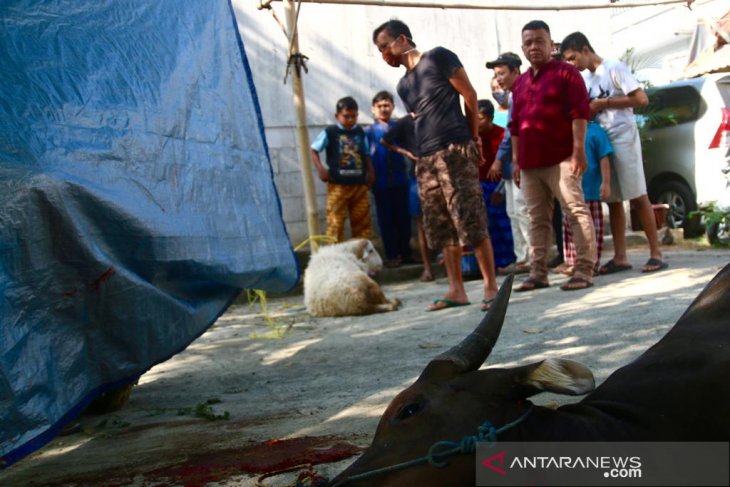
However, when Ibrahim placed the knife to his son’s neck, Allah changed his son into a lamb.
Annually, Muslims commemorate the story of Ibrahim, found not only in Qur’an but also in the Jews’ Book of Genesis and the Bible of Christians. Adha is an Arabic word referring to an act of sacrifice.
During this year’s Eid al-Adha, Muslims across the world will slaughter the sacrificed animals from July 31 to August 3.
Related news: Hajj pilgrimage in the wake of the COVID-19 pandemic
Related news: Message of Idul Adha to Indonesian Muslims amid COVID-19 pandemic
Editor: Fardah Assegaf
Copyright © ANTARA 2020
